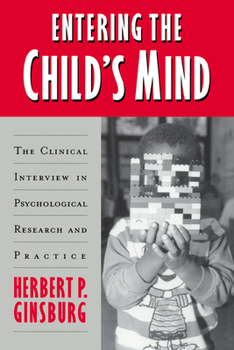Entering the Child's Mind: The Clinical Interview in Psychological Research and Practice
Select Format
Select Condition 
Book Overview
Entering the Child's Mind teaches the clinical interview as a technique for gaining insight into a child's way of thinking. In the tradition of Piaget and Vygotsky, Dr. Ginsburg argues that standardized instruments of evaluation often fail to meet the challenges of complex cognition. He presents the clinical interview as a powerful tool that, when understood and used properly, can provide psychologists with a profound appreciation for children's thinking...
Format:Paperback
Language:English
ISBN:0521498031
ISBN13:9780521498036
Release Date:November 1997
Publisher:Cambridge University Press
Length:296 Pages
Weight:0.90 lbs.
Dimensions:0.8" x 5.7" x 9.4"
Customer Reviews
1 rating
An easy and insightful read!
Published by Thriftbooks.com User , 14 years ago
This is an excellent and enjoyable book that provides insight into finding out what children actually know. Dr. Ginsburg is a very well-respected expert in the field of children's development of mathematical thinking. Through the use of the Clinical Interview Dr. Ginsburg shows us how to talk to children at a level they understand and with respect for what the child knows. The Clinical Interview allows the researcher to gain insight into the interviewee's mind through the use of questions such as, "How did you know that?" and "If you had to explain this to a classmate, what would you tell them?" Though the questions seem simple, try talking to a six year old about a math problem they just did wrong without a) telling them they're wrong b) asking a question that leads them to the answer you want to hear and c) intimidating them with your "authority." What this technique does is allow the interviewee to speak freely and go in the direction that their thoughts are taking them. What you as the researcher discover is that oftentimes a child who produces the "wrong" answer may actually producing the "right" answer to the question they THOUGHT you were asking*. Through the Clinical Interview you can discover what they child understood and what they thought they were trying to do. The data you get from this technique is unlike any other and Dr. Ginsburg shows that even thinking about this technique will forever change the way you interact/think about children. *simple example* Interviewer asks child to add two double-digit numbers (23+19, but presented vertically). The child's answer is 150, not 42. By asking the child enough questions about how they got their answer you may discover the child had his rules wrong. The child correctly added 9+3, got 12, carried the whole 12 and placed it above the 2 from 23, then the he placed a 0 below the nine. The child then added 12+2+1 to get 15, which he placed next to the 0, producing 150. As you can see, he is correctly performing addition, but has some confusion with the rules (he thinks you carry the whole number not just the tens). The child also seems to have some division rules mixed in with their addition rules, which is why he added the 0 below the 9 before moving to adding up the next column. What this tells you is the child isn't just plain wrong, he needs help better understanding the rules of addition because they are not all in place yet. You can find all of this out by simply "conducting" a Clinical interview.... which is essentially asking the child the right questions.




